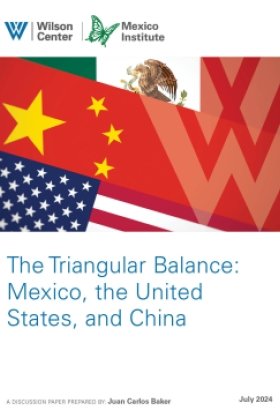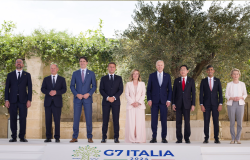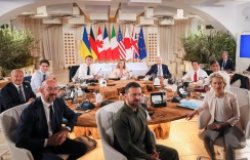The Death of Trilateralism in the NAFTA Neighborhood: Views from the United States, Mexico, and Canada
Three panelists reviewed the 1994 North American Free Trade Agreement (NAFTA) and the evolution of regional economic cooperation.
Overview
with
Laura Dawson, Public Policy Scholar, Woodrow Wilson Center
Antonio Ortiz Mena, Head of Section, Economic Affairs, Mexican Embassy
Christopher Sands, Senior Fellow, Hudson Institute
Three panelists reviewed the 1994 North American Free Trade Agreement (NAFTA) and the evolution of regional economic cooperation among the United States, Mexico, and Canada at an off-the-record event hosted by the Canada Institute and the Mexico Institute. Because this event was off-the-record and not for attribution, we present only a summary of the general discussion.
The three participants reexamined the assumption of a “post-NAFTA world,” specifically discussing whether “trilateralism is dead” and how the three countries can move forward from the status quo. There was a review of the background of NAFTA, which highlighted that the agreement was based on decisions of pragmatic economic and national interests rather than a grand vision for North America. Moreover, panelists highlighted NAFTA’s achievements in trade and investment. NAFTA was the first modern free trade agreement between developed and developing countries, which promoted greater economic integration but had no mandate for political integration. North American trade has tripled since 1994; the continent did less than $300 billion in trade in 1994, reached a peak of $942 billion in 2008, and has been declining since then.
Looking at the “death” of trilateralism, panelists agreed such analysis is exaggerated. They provided examples of underlying regional cooperation, examples that do not necessarily garner significant attention, and offered potential areas for engagement among the countries. While trilateralism is not dead, dual bilateralism, in which the United States works with Canada and Mexico separately, has become more common. Participants noted this is particularly apparent when dealing with regulatory, energy, and border issues. Countries are still, however, looking to harmonize and work toward trilateralism.
There was discussion about how NAFTA—primarily a trade agreement for traditional goods, but also services, agriculture, procurement and investment trade—is no longer state of the art and is unable to deal with contemporary issues. Participants emphasized the need to focus on issues such as regulatory cooperation, infrastructure, and border efficiency, among others.
Participants acknowledged the challenge—and great opportunity—of emerging Asian markets and the subsequent need for strategic incentives for deeper economic integration among the United States, Mexico, and Canada.
They underscored the value in being pragmatic and focusing on greater regional trade integration and engagement. Moreover, participants discussed the importance of leadership in reaching out to continental neighbors and moving trilateralism forward. In addition to governments speaking to each other, there was discussion of the need for civil society, academia, and business leaders to also engage trilaterally.
In order to move beyond the status quo, there was discussion about whether North American economic integration needed a new grand plan or whether the three countries need to focus on working together better on a variety of “small” issues instead. Participants also reviewed the importance of engaging regions, including the southern and northern U.S. borders, on relevant issues. Furthermore, there was discussion of the need for a new discourse on regional cooperation because North America is about more than the NAFTA.
Speakers
Hosted By

Canada Institute
The mission of the Wilson Center's Canada Institute is to raise the level of knowledge of Canada in the United States, particularly within the Washington, DC policy community. Research projects, initiatives, podcasts, and publications cover contemporary Canada, US-Canadian relations, North American political economy, and Canada's global role as it intersects with US national interests. Read more

Mexico Institute
The Mexico Institute seeks to improve understanding, communication, and cooperation between Mexico and the United States by promoting original research, encouraging public discussion, and proposing policy options for enhancing the bilateral relationship. A binational Advisory Board, chaired by Luis Téllez and Earl Anthony Wayne, oversees the work of the Mexico Institute. Read more
Thank you for your interest in this event. Please send any feedback or questions to our Events staff.














